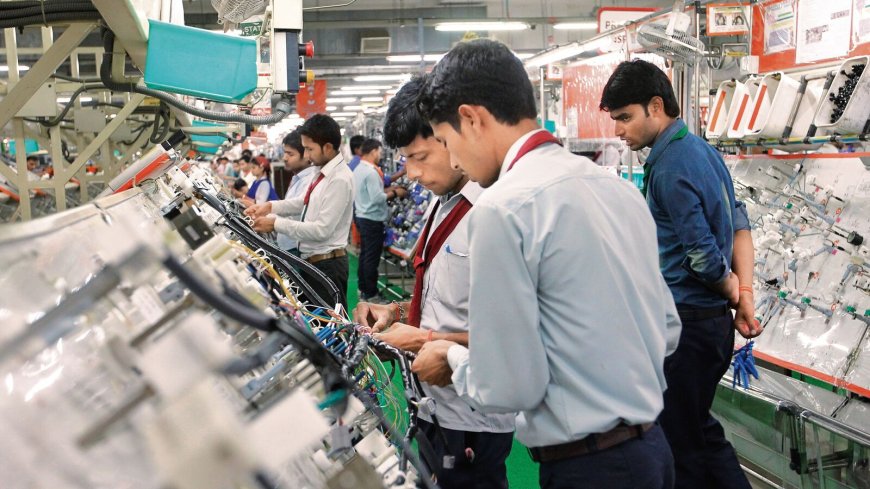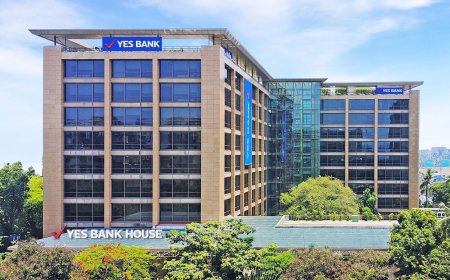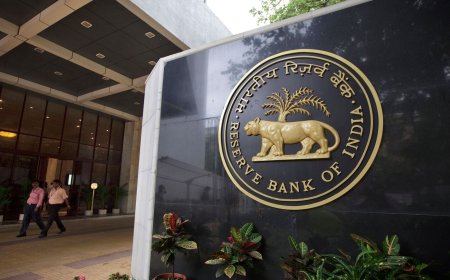PMI: Business Confidence of Indian Manufacturers Dips Despite Punchy Exports
India’s manufacturing PMI for June held steady at 58.3, but business confidence slipped to a 5-month low amid cost pressures and global uncertainties. Exports remain strong, but concerns are rising.

Mumbai, July 1, 2025:
India’s manufacturing sector continued to expand in June 2025, supported by strong export orders and robust output growth. However, business confidence among Indian manufacturers slipped to a five-month low, according to the latest Purchasing Managers’ Index (PMI) data released by HSBC and S&P Global on Monday.
The seasonally adjusted HSBC India Manufacturing PMI came in at 58.3 in June, slightly below May’s reading of 58.4, indicating a steady pace of expansion. While the headline figure remains firmly in growth territory (above 50), what raised eyebrows was a noticeable dip in the future output expectations index—a key proxy for business confidence.
Confidence Wanes Amid Strong Fundamentals
Manufacturers cited concerns over cost inflation, geopolitical uncertainties, and the sustainability of current demand levels as reasons for their lowered optimism for the year ahead. This shift comes despite India’s exports rising at their fastest pace in over a year, led by demand from key markets like the US, Europe, and Southeast Asia.
"Export orders have provided a cushion for manufacturing, especially in sectors like textiles, chemicals, and electronics," said Pranjul Bhandari, Chief India Economist at HSBC. "However, firms are clearly becoming cautious, especially as they grapple with rising input prices and uncertainties around global monetary policy directions."
Input Costs Back on the Rise
After a period of relative stability, input costs picked up in June, driven by higher prices of raw materials like steel, plastics, and chemicals. The input cost inflation rate, while still moderate compared to the post-pandemic peaks, was the highest in three months.
Some manufacturers passed on the higher costs to customers, leading to modest output price inflation, but others chose to absorb the pressure to remain competitive, particularly in export-driven segments.
"Cost control will be critical moving forward," said Shraddha Bhansali, COO at a mid-sized automotive components firm in Pune. "We're seeing bulk orders from overseas, but price sensitivity is high. We can't afford to price ourselves out of global markets."
Employment Sees Marginal Uptick
On the employment front, the PMI survey noted a modest increase in hiring, marking the sixth consecutive month of job creation. However, the pace remained slow, reflecting the cautious mood of manufacturers who are waiting for clearer global economic signals before committing to large-scale expansion.
"Workforce expansion is happening, but it’s calibrated and selective," said Amit Shankar, an industrial economist. "Firms are focused on productivity gains through automation and digitisation rather than purely headcount expansion."
Domestic Demand Slows Slightly
While exports surged, domestic demand showed signs of moderation. Consumer goods firms reported slower growth in new orders, attributing it to post-election uncertainties and uneven monsoon patterns that may affect rural consumption.
"This is a typical mid-year pause," said Siddharth Roy, a senior analyst at Nomura India. "We expect domestic demand to rebound by the festive season, especially if monsoons normalize and the new government boosts infrastructure spending."
Market Context: India’s Manufacturing Still a Global Bright Spot
Globally, manufacturing sectors in China, Germany, and the UK are facing more severe contractions or stagnation, largely due to sluggish demand and elevated interest rates. In this context, India remains a bright spot with consistent PMI readings above 58 for six straight months.
India’s performance is being closely watched by global investors as the country continues to emerge as a preferred alternative to China in the global supply chain, especially in electronics, pharmaceuticals, and auto components.
Investor Outlook: Positive but Watchful
Despite the softening confidence levels, investors remain largely optimistic about India’s manufacturing trajectory. Shares of manufacturing and export-linked firms—especially those in engineering, chemicals, and capital goods—have outperformed broader indices in recent weeks.
However, analysts advise caution going forward, as sentiment can shift rapidly in response to global cues.
"Markets are pricing in strong earnings growth from manufacturing firms, but this optimism depends heavily on external demand and cost pressures staying manageable," said Rekha Mehta, Head of Equities at Vardhan Capital. "The PMI dip in sentiment is a reminder that even in high-growth environments, businesses are not immune to global shocks."
While India’s manufacturing engine continues to hum along, helped by a surge in export demand, the dip in business confidence suggests that firms are navigating a more complex landscape in the second half of 2025. Supply chain resilience, cost management, and policy clarity will be crucial in maintaining momentum.
Investors and policymakers alike will be watching the next few months closely—especially for signs that weakening sentiment may spill over into output and hiring trends.
What's Your Reaction?
 Like
0
Like
0
 Dislike
0
Dislike
0
 Love
0
Love
0
 Funny
0
Funny
0
 Angry
0
Angry
0
 Sad
0
Sad
0
 Wow
0
Wow
0













































































